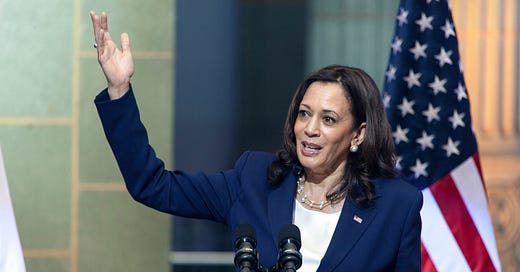Who Should Kamala Harris Pick as Her VP?
The biggest decision of Harris' campaign could come any day now
Vice President Kamala Harris will announce her running mate sometime early next week. This will be the biggest decision of her campaign. It will tell us a lot about how she plans to govern — and most importantly, how she plans to win.
Serious presidential candidates, like Harris and unlike Trump, look for a governing partner who brings to the table things that they themselves may be lacking. Barack Obama saw Joe Biden’s deep relationship on Capitol Hill as a huge asset given how new Obama was to Washington. No criteria are more important than readiness to assume the presidency at a moment's notice should a tragedy occur.
Kamala Harris and her team are in the final stages. The vetting team met with all of the leading candidates and plans to meet again with the finalists over the weekend.
Once the readiness threshold is crossed and the governing questions are answered, the decision becomes about politics — who gives Harris the best chance of winning the White House?
The impact of the various choices are surrounded by debate and speculation. As we await the Vice President’s vice presidential decision, here are some thoughts on the politics of her choice.
1. What Should She Look for Politically?
A few weeks ago (which feels like a decade ago) when Trump picked JD Vance, I laid out the various political factors that candidates consider when picking a vice president. I wrote:
Some selections involve putting a key state in play. In 2004, John Kerry placed John Edwards on the ticket in hopes that Edwards could deliver his home state of North Carolina. Sometimes, it’s about appealing to a specific constituency group. Trump picked Pence for two reasons: He was one of the only people willing to say yes, but Pence also had a specific appeal to Evangelical voters. This group is critical to the Republican coalition and was very skeptical of the thrice-married cad from Manhattan. Another approach is seeking out ideological balance on the ticket — usually in the form of moderation.
Finally, the last approach is having someone who addresses a specific weakness. In 1992, a scandal-plagued Bill Clinton picked Al Gore partly because Gore was known for his ethical conduct. In 2000, Gore chose Joe Lieberman for the same reasons. Eight years of serving with Clinton had tainted Gore’s once sterling reputation.
The Harris campaign is wrestling with hard questions. Is there a specific weakness to address? Is there a voting bloc they want to shore up? Or is there a broader message they want to send with the selection?
2. Can the VP Really Deliver Their State?
The vice presidential selection process is a little bit like Fight Club: the first and second rules are that you don’t talk about the process. The people chirping to reporters about Harris’ potential running mate are the ones who don’t really know anything. They aren’t in the room where the discussions are happening or where the decision will be made.
Keep reading with a 7-day free trial
Subscribe to The Message Box to keep reading this post and get 7 days of free access to the full post archives.



